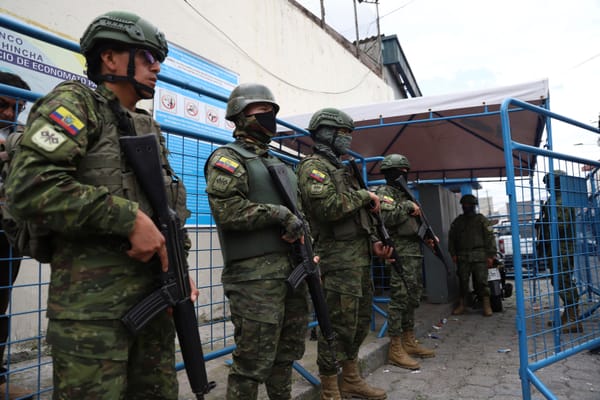A little more than a month into the presidency of Daniel Noboa, Ecuador has descended into chaos. The triggering event was the daring escape from prison of José Adolfo Macías Villamar, head of the Choneros, the country’s most notorious drug-trafficking gang. In response, the newly elected president declared a nationwide manhunt and a 60-day state of emergency. By the following day, firefights and prison riots had erupted around the country, with armed men kidnapping, live on air, the anchors of one of the most important television stations.
A peaceful country not long ago, Ecuador has taken a turn for the worse in recent years, with homicides surging to 26 per 100,000 last year, up from around 7 per 100,000 in 2020. Since the end of the pandemic, the country has fallen victim to a broader restructuring in the international drug trade. The collapse in the price of coca—the raw crop used to make cocaine—in neighboring Colombia has seemingly made exporting cocaine out of Ecuador more attractive. At the same time, the growing popularity in the United States of synthetic drugs like fentanyl has stoked competition among traffickers for routes to more lucrative cocaine markets across the Pacific.
Chief among the beneficiaries of Ecuador’s new criminal landscape are the Choneros. The gang’s close ties to Joaquín “El Chapo” Guzmán’s Sinaloa cartel have led to a proxy war with the Los Lobos gang, which is backed by the Sinaloa rival, Cartel Jalisco Nueva Generación. As for Macías, the fugitive drug lord was already well-known for a similar jailbreak in 2013 and has since cultivated the celebrity of an Ecuadorian Pablo Escobar. This week, he recorded and released a narcocorrido—a genre of narrative folk ballad that glorifies drug traffickers—taunting authorities.
In the days leading to Macías’ escape, Noboa was busy finalizing a proposed referendum that would allow for the extradition of Ecuadorian citizens and widen the ability of authorities to seize assets from criminals. The campaign of terror now being waged by Macías and the Choneros has allowed the administration to assume considerable powers on the security front. Under the current state of exception, citizens’ rights have been suspended and the military has been mobilized to fight the gangs.
“Ecuador likely doesn’t have the manpower, resources, or knowhow to replicate Bukele’s success.”
Noboa’s aggressive actions have raised hopes that his government will undertake a systematic crackdown against organized crime in the style of his Salvadoran counterpart, Nayib Bukele. The reality is that Ecuador likely doesn’t have the manpower, resources, or knowhow to replicate Bukele’s success. Throughout Latin America, political leaders have imposed states of emergency time and again to rein in criminal violence, to little avail—El Salvador being the notable exception. Indeed, Noboa’s immediate predecessor, Guillermo Lasso, also instituted multiple 60-day states of exception during his term, including in August 2023, following the assassination of presidential candidate Fernando Villavicencio.
The reason for this failure is instructive. In the short term, the most effective way to combat crime—whether under authoritarian or democratic rule—is by reducing impunity. Latin America has some of the highest rates of impunity in the world, with the vast majority of violent crimes in countries like Ecuador going unsolved. El Salvador’s success comes from the simple fact that the country has been able to jail vast numbers of suspected criminals and keep them there under the expanded powers assumed by Bukele’s government. Appropriately, the Central-American nation’s state of exception has been ongoing for almost two years now, leaving an open question as to what will happen to those who have been imprisoned once the so-called emergency ends.
It remains to be seen whether Ecuador is even capable of making mass arrests and keeping inmates in its already overcrowded prisons. Given the frequency of riots and kidnappings in so many of the country’s prisons, this is highly uncertain. Indeed, the country’s gangs—as in Central America—are primarily a prison phenomenon. To that end, Noboa’s efforts to secure the extradition of Ecuadorian citizens and expel more than 1,500 of the country’s foreign criminals are steps in the right direction. For the time being, however, the country is in for a continued wave of violence. We can only hope the young president has learned from his predecessor's mistakes.
